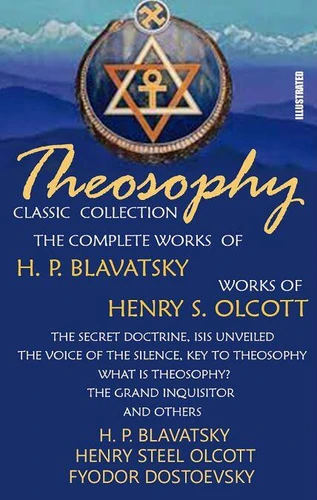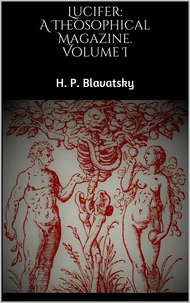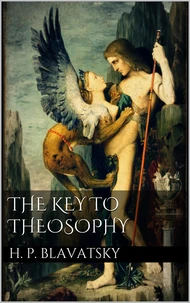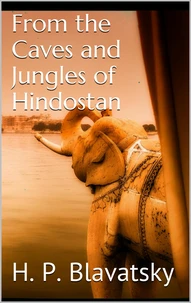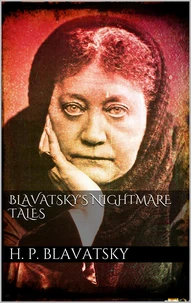Theosophy. Classic Collection. The Complete Works of H. P. Blavatsky. Works of Henry S. Olcott. Illustrated. The Secret Doctrine, Isis Unveiled, The Voice of the Silence, Key To Theosophy, What Is Theosophy?, The Grand Inquisitor and others
Par : , ,Formats :
Disponible dans votre compte client Decitre ou Furet du Nord dès validation de votre commande. Le format ePub est :
- Compatible avec une lecture sur My Vivlio (smartphone, tablette, ordinateur)
- Compatible avec une lecture sur liseuses Vivlio
- Pour les liseuses autres que Vivlio, vous devez utiliser le logiciel Adobe Digital Edition. Non compatible avec la lecture sur les liseuses Kindle, Remarkable et Sony
 , qui est-ce ?
, qui est-ce ?Notre partenaire de plateforme de lecture numérique où vous retrouverez l'ensemble de vos ebooks gratuitement
Pour en savoir plus sur nos ebooks, consultez notre aide en ligne ici
- Nombre de pages7929
- FormatePub
- ISBN978-617-8289-11-9
- EAN9786178289119
- Date de parution15/02/2023
- Protection num.pas de protection
- Taille10 Mo
- Infos supplémentairesepub
- ÉditeurAndrii Ponomarenko
Résumé
Theosophy is a religion established in the United States during the late 19th century. It was founded primarily by the Russian Helena Blavatsky and draws its teachings predominantly from Blavatsky's writings. Categorized by scholars of religion as both a new religious movement and as part of the occultist stream of Western esotericism, it draws upon both older European philosophies such as Neoplatonism and Asian religions such as Hinduism and Buddhism.
At a meeting of the Miracle Club in New York City on 7 September 1875, Blavatsky, Olcott, and Judge agreed to establish an organisation, with Charles Sotheran suggesting that they call it the Theosophical Society.
Prior to adopting the name "Theosophical", they had debated various potential names, among them the Egyptological Society, the Hermetic Society, and the Rosicrucian Society. The term was not new, but had been previously used in various contexts by the Philaletheians and the Christian mystic Jakob Böhme. Etymologically, the term came from the Greek theos ("god(s)") and sophia ("wisdom"), thus meaning "god-wisdom", "divine wisdom", or "wisdom of God".
The term theosophia appeared (in both Greek and Latin) in the works of early church fathers, as a synonym for theology. In her book The Key to Theosophy, Blavatsky said that the term Theosophy had been coined by "the Alexandrian philosophers", especially Ammonius Saccas. Contents: H. P. Blavatsky ISIS UNVEILED FROM THE CAVES AND JUNGLES OF HINDOSTAN WHAT IS THEOSOPHY? WHAT ARE THE THEOSOPHISTS? MAHATMAS AND CHELAS OCCULT OR EXACT SCIENCE? THE ESOTERIC CHARACTER OF THE GOSPELS OCCULTISM VERSUS THE OCCULT ARTS IS THEOSOPHY A RELIGION? THE VOICE OF THE SILENCE THE KEY TO THEOSOPHY THE SECRET DOCTRINE ADVENTURE AMONG THE ROSICRUCIANS THE GRAND INQUISITOR (Translated by H.
P. Blavatsky) Henry Steel Olcott THE LIFE OF BUDDHA AND ITS LESSONS THE BUDDHIST CATECHISM THE GOLDEN RULES OF BUDDHISM THE SPIRIT OF ZOROASTRIANISM
Prior to adopting the name "Theosophical", they had debated various potential names, among them the Egyptological Society, the Hermetic Society, and the Rosicrucian Society. The term was not new, but had been previously used in various contexts by the Philaletheians and the Christian mystic Jakob Böhme. Etymologically, the term came from the Greek theos ("god(s)") and sophia ("wisdom"), thus meaning "god-wisdom", "divine wisdom", or "wisdom of God".
The term theosophia appeared (in both Greek and Latin) in the works of early church fathers, as a synonym for theology. In her book The Key to Theosophy, Blavatsky said that the term Theosophy had been coined by "the Alexandrian philosophers", especially Ammonius Saccas. Contents: H. P. Blavatsky ISIS UNVEILED FROM THE CAVES AND JUNGLES OF HINDOSTAN WHAT IS THEOSOPHY? WHAT ARE THE THEOSOPHISTS? MAHATMAS AND CHELAS OCCULT OR EXACT SCIENCE? THE ESOTERIC CHARACTER OF THE GOSPELS OCCULTISM VERSUS THE OCCULT ARTS IS THEOSOPHY A RELIGION? THE VOICE OF THE SILENCE THE KEY TO THEOSOPHY THE SECRET DOCTRINE ADVENTURE AMONG THE ROSICRUCIANS THE GRAND INQUISITOR (Translated by H.
P. Blavatsky) Henry Steel Olcott THE LIFE OF BUDDHA AND ITS LESSONS THE BUDDHIST CATECHISM THE GOLDEN RULES OF BUDDHISM THE SPIRIT OF ZOROASTRIANISM
Theosophy is a religion established in the United States during the late 19th century. It was founded primarily by the Russian Helena Blavatsky and draws its teachings predominantly from Blavatsky's writings. Categorized by scholars of religion as both a new religious movement and as part of the occultist stream of Western esotericism, it draws upon both older European philosophies such as Neoplatonism and Asian religions such as Hinduism and Buddhism.
At a meeting of the Miracle Club in New York City on 7 September 1875, Blavatsky, Olcott, and Judge agreed to establish an organisation, with Charles Sotheran suggesting that they call it the Theosophical Society.
Prior to adopting the name "Theosophical", they had debated various potential names, among them the Egyptological Society, the Hermetic Society, and the Rosicrucian Society. The term was not new, but had been previously used in various contexts by the Philaletheians and the Christian mystic Jakob Böhme. Etymologically, the term came from the Greek theos ("god(s)") and sophia ("wisdom"), thus meaning "god-wisdom", "divine wisdom", or "wisdom of God".
The term theosophia appeared (in both Greek and Latin) in the works of early church fathers, as a synonym for theology. In her book The Key to Theosophy, Blavatsky said that the term Theosophy had been coined by "the Alexandrian philosophers", especially Ammonius Saccas. Contents: H. P. Blavatsky ISIS UNVEILED FROM THE CAVES AND JUNGLES OF HINDOSTAN WHAT IS THEOSOPHY? WHAT ARE THE THEOSOPHISTS? MAHATMAS AND CHELAS OCCULT OR EXACT SCIENCE? THE ESOTERIC CHARACTER OF THE GOSPELS OCCULTISM VERSUS THE OCCULT ARTS IS THEOSOPHY A RELIGION? THE VOICE OF THE SILENCE THE KEY TO THEOSOPHY THE SECRET DOCTRINE ADVENTURE AMONG THE ROSICRUCIANS THE GRAND INQUISITOR (Translated by H.
P. Blavatsky) Henry Steel Olcott THE LIFE OF BUDDHA AND ITS LESSONS THE BUDDHIST CATECHISM THE GOLDEN RULES OF BUDDHISM THE SPIRIT OF ZOROASTRIANISM
Prior to adopting the name "Theosophical", they had debated various potential names, among them the Egyptological Society, the Hermetic Society, and the Rosicrucian Society. The term was not new, but had been previously used in various contexts by the Philaletheians and the Christian mystic Jakob Böhme. Etymologically, the term came from the Greek theos ("god(s)") and sophia ("wisdom"), thus meaning "god-wisdom", "divine wisdom", or "wisdom of God".
The term theosophia appeared (in both Greek and Latin) in the works of early church fathers, as a synonym for theology. In her book The Key to Theosophy, Blavatsky said that the term Theosophy had been coined by "the Alexandrian philosophers", especially Ammonius Saccas. Contents: H. P. Blavatsky ISIS UNVEILED FROM THE CAVES AND JUNGLES OF HINDOSTAN WHAT IS THEOSOPHY? WHAT ARE THE THEOSOPHISTS? MAHATMAS AND CHELAS OCCULT OR EXACT SCIENCE? THE ESOTERIC CHARACTER OF THE GOSPELS OCCULTISM VERSUS THE OCCULT ARTS IS THEOSOPHY A RELIGION? THE VOICE OF THE SILENCE THE KEY TO THEOSOPHY THE SECRET DOCTRINE ADVENTURE AMONG THE ROSICRUCIANS THE GRAND INQUISITOR (Translated by H.
P. Blavatsky) Henry Steel Olcott THE LIFE OF BUDDHA AND ITS LESSONS THE BUDDHIST CATECHISM THE GOLDEN RULES OF BUDDHISM THE SPIRIT OF ZOROASTRIANISM

